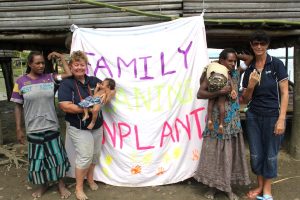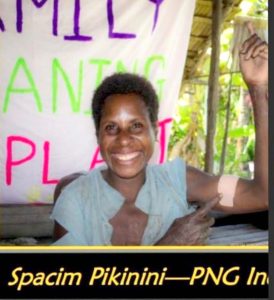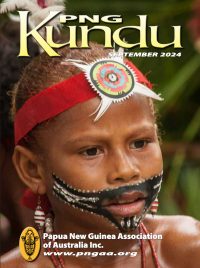Save the Kula Babies—Spacim Pikinini-PNG Inc.
 Wendy Stein OAM, PP, PHF—Project Manager
Wendy Stein OAM, PP, PHF—Project Manager
Wendy Stein OAM became a Rotarian in 2005 and has for more than 20 years dedicated her life to mothers and children in need of medical assistance in Papua New Guinea. Her interest in PNG started during a visit to Mando village near Goroka in the Eastern Highlands in 2005. Seeing the need for clean running water was a catalyst for the work she continued with, managing four Rotary Australia World Community Service (RAWCS) projects.
The longest running of these, and still running, is the volunteer-run charity organisation called Save the Kula Babies—Spacim Pikinini-PNG Inc., of which Wendy is CEO.
Spacim pikinini in Tok Pisin refers to family planning—literally ‘spread out children’. The ‘Save the Kula Babies—Spacim Pikinini’ program provides safe, reliable, and reversible, family planning by way of subdermal contraceptive implants to women and young girls in remote areas. The work takes place on a floating medical clinic, called Kula Spirit, based in Alotau, Milne Bay Province. Some of the areas visited include; Normanby, Esa’ala and Ferguson, with a focus on Bomada Aid Post, Esa’ala Health Centre, Dobu Aid Post, Boduya Health Centre, Ulisalolo Sub-health Centre, Mapamoiwa Health Centre and Igwageda Aid Post. Plans are underway for an outreach to Louisiade Archipelago in August 2024, after the cyclone season, which will involve the project’s medical team spending several weeks in remote islands once again.
The Kula Spirit, a 44-foot fishing trawler owned by Wendy, was set up as a floating outreach clinic visiting remote villages on islands in Milne Bay, beyond the reach of adequate, if any, medical services. The vessel was purchased when health workers taking family planning implants to remote communities in Sumkar District, north of Madang, had mishaps in small banana boats.
‘Taking family planning to the people and addressing their needs is our priority,’ Stein said. ‘Many islanders faced food security issues, chronic diseases, conflicts, and other social problems. Forty percent of pregnancies in developing countries were unintended. So to reduce the unintended, we are providing family planning at one’s doorstep to save maternal and child deaths. It also empowers women and girls so they can contribute to national development’, Stein said.
The boat was sold in December 2023 and the project intends using donated vessels in 2024. Wendy has been teaching nurses, medical students and young doctors how to insert the implants. Under her supervision, some 60,000 of these devices which ensure contraception for almost five years, have been used in PNG. These Jadelle double implants allow for fertility to return as soon as the implants are removed.
‘Save the Kula Babies’ program provides free disability support services, new medical equipment to clinics and hospitals, hearing aids, and spectacles, as well as solar suitcases, thanks to international donors, mostly from Australia. Solar cases are a compact high-powered battery bank designed in conjunction with Durst Industries (Aust.) Pty Ltd and Rotary for use in remote regions. They provide light in remote health centres to assist health workers when access to electricity is limited, and are also vital in times of natural disaster. As the light in most bush material facilities is dark, when performing procedures such as implants even during the day, the team needs to wear head torches.
The CWA NSW has also supported the program by providing Mother and Baby Packs that encourage pregnant women to attend health facilities to ensure safer delivery of babies and to receive information on family planning; the mantra being ‘less children, more love and resources per child, including health and education’.
‘Save the Kula Babies’ project is supported by, or partners with the PNG national government, the Obstetrics and Gynaecology division at UPNG, Rotary International, DFAT through Australian Volunteer Doctors, the Australian-based DAK Foundation, the Dick and Pip Smith Foundation, and Fastair Services for freight.
Wendy advised that their latest outreach, which was in Nov/Dec 2023, involved:
Working with DFAT’s Australian Volunteer Doctors program, which resulted in supplying from their clinic, medications, consumables, gloves and equipment, that were desperately needed for health facilities for their work. Due to continual shortages in the country, life-saving medicines are always scarce and our help is much appreciated. Doctors cannot save lives without continual supplies.
References:
Amba, J, 2016, ‘Floating Clinic Delivers’, The National Newspaper, Port Moresby, PNG. Available online at https://www.thenational.com.pg/floating-clinic-delivers/
Facebook: Spacim Pikinini-PNG
Valentine, J, 2017, Tainui’s Travels. https://tainui.org/png-maritime-outreach/
YouTube: wendystein1
Editor’s Note: The information in this article was provided by Wendy Stein OAM, PP, PHF, Kula Spirit Floating Clinic (Rotary), Spacim Pikinini-PNG Inc., Rotary Australia (RAWCS). The photos are from Wendy’s FaceBook page, with her approval.
If members wish to support or know more about the project, they can look for the website: RAWCS Save the Kula Babies Spacim Pikinini No. 18/2009/10



